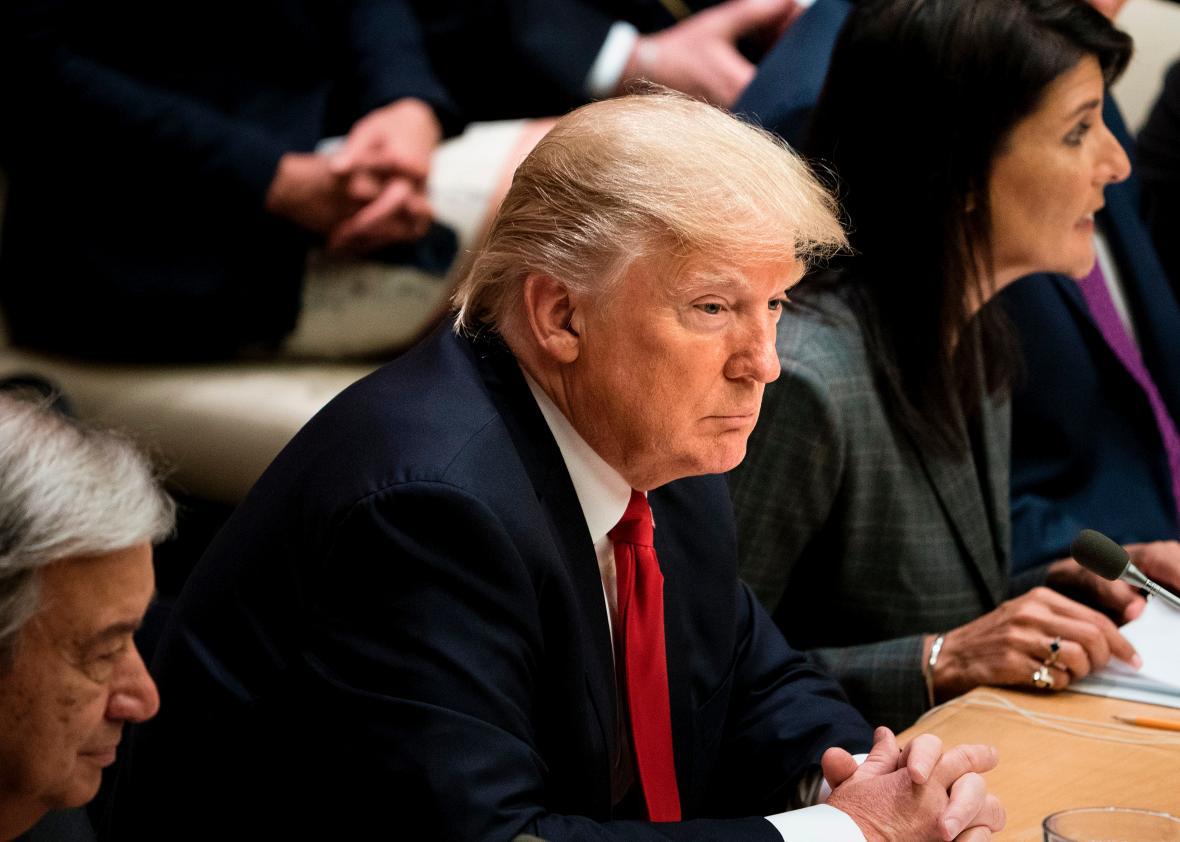President Trump got off to an underwhelming start at the U.N. General Assembly on Monday morning. He sat on a panel flanked by various diplomats, including Ambassador Nikki Haley, who introduced him before he delivered some brief remarks, and it would be charitable to describe the welcoming applause as “light.”
Then came the clunker. Haley had told the assembled that the new American president sees “tremendous potential” in the U.N.—a cold enough slap at an organization that’s been around for 72 years and, for all its flaws, has accomplished quite a bit. But Trump followed that dig with a face-splash of ice water, saying that the real “potential” he saw was “right across the street”—a reference to one of his East Side real-estate projects—and noted that the U.N.’s presence was what gave it such potential.
It’s so typical of Trump to view the rest of the world, even the official assembly of the world’s leaders, as a footnote to the saga of his own wealth.
Trump’s remarks, which he read from notes, were brief and inconsequential. U.N. reform was the topic on the agenda, and Trump spoke of the need to “focus more on people and less on bureaucracy” and to ensure that no one member-state “shoulders a disproportionate share of the burden … militarily or financially.”
In that last line, he may have flashed a glimpse of his “America First” theme, which is expected to shine front and center in his longer address to the General Assembly—his first as president—on Tuesday.
The issues facing the leaders and delegates from the 193 member-states this year are especially varied and complex: terrorism, climate change, cyberattacks, refugees, North Korean missile and nuclear tests, the chaos across the Middle East and North Africa, Russian threats to Ukraine, Chinese expansionism. And the question on the minds of many is whether this new eccentric president will step into America’s traditional leadership role or retreat to a mix of military unilateralism and diplomatic isolation—and if he does take a stab at leadership, whether he has the slightest talent for it.
Monday’s ceremonies held no high promises, and not just because of Trump’s tepid welcome. Bureaucratic reform generally tops an agenda when the heads of an organization—whether national, international, or corporate—don’t know how to grasp the substance of their crises. Yes, the U.N. is an inefficient maze with diffuse and cumbersome procedures. But sleeker organizational charts and zero-based budgeting aren’t going to solve the problems that the United Nations was founded to solve.
It is bizarre that, after Trump read his brief remarks Monday morning, U.N. Secretary-General António Guterres said that when he can’t sleep at night, it’s because he’s worried about “bureaucracy.” This is a strange thing for the head of the U.N. to have on his mind when he should be worried and brooding about so many other things, including things that are not merely wasting money but killing people.
Guterres’ statement was reminiscent of Secretary of State Rex Tillerson’s obsession with management initiatives and reorganization schemes for Foggy Bottom. No one should be puzzled by any of this. In both cases, their bureaucratic mindsets reflect a lack of imagination, an impoverishment of ideas.
At a moment when the United Nations could play a major role at least as a prodding forum for creative negotiations, its managers seem to be engaged in little more than shuffling the deck chairs on a ship of fools.
